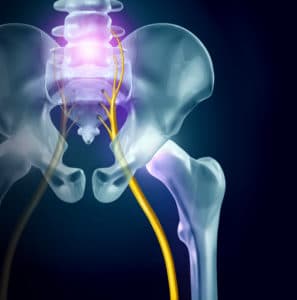What is Sciatica?
Sciatica is a general term describing symptoms that result from injury to the sciatic nerve, the largest nerve in the body, which travels from the base of the spine to the feet and toes. The sciatic nerve controls the muscles in the legs and feet and provides sensation to these areas. When the sciatic nerve is pinched due to a slipped disc, herniated disc, disc protrusion, bone spur or other spinal problem in the lower back, sciatica can occur. Contributing factors may include normal degenerative changes of the aging process, sports injury, tumor, infection or other disease processes.

Symptoms of Sciatica
Sciatica can cause pain that originates in the lower back and extends to the buttocks, legs, and feet. Shooting pain in the legs, cramping, muscle weakness, tingling sensation, and numbness are also common symptoms of sciatica. Sciatica usually affects only one side of the body, but it can affect both, and in severe cases, sciatica can result in loss of mobility.
What Causes Sciatica?
The sciatic nerve, located in the lumbar spine (low back), is made up of five sets of paired nerve roots. This nerve starts at the back of the pelvis and travels downward, under the buttock toward the back of the leg. Sciatica is a term that describes the pain and other symptoms originating in the sciatic nerve. Usually, symptoms indicate that one or more of the nerve roots that join the sciatic nerve is being compressed. Compression usually occurs in the low back before the nerve root joins the sciatic nerve.
There are several potential reasons for nerve root compression, including:
- A herniated disc, a condition in which the soft center of a disc leaks out of the harder outer shell.
- Injury to the low back, which could occur in an accident or by lifting a heavy object.
- Lumbar spinal stenosis is a degenerative condition in which the spinal canal narrows over time.
- Piriformis syndrome originates with a deep muscle in the buttock that presses on the sciatic nerve.
- Spondylolisthesis, in which a vertebra slips forward over the one beneath it, may coincide with disc degeneration.
- A spinal tumor may be a benign or cancerous growth in the spinal canal or column that presses on one or more nerve roots.
Can You Prevent Sciatica?
Because many cases of sciatica are related to compression in the low back or lumbar spine, there are measures that may be taken to reduce the risk of developing pain. These include:
- Avoiding habits such as smoking, which contributes to disc degeneration.
- Engage in regular exercise to support muscle tone in the core. The abdominal muscles are just as important to spinal strength as are the back muscles.
- Sit safely, changing positions approximately every thirty minutes.
- Lift safely, squatting to pick up heavier objects rather than bending. Also, hold objects close to the body to reduce strain on the back.
Is Sciatica Permanent?
Sciatica pain is typically not a permanent problem. The key to resolving pain is to identify the cause of nerve compression and then alleviate pressure on the sciatic nerve using appropriate modalities.
Diagnosing Sciatica
A consultation and examination for sciatica pain will involve a thorough health history, a physical and neurological exam, and, in some cases, imaging.
During the consultation, the doctor will ask questions to better understand the pain being experienced. For example, where does the pain start, and where does it travel? Does pain travel down the back or side of the leg? Does pain affect one leg or both? It is important to discuss all sensations in as much detail as possible.
The physical examination of pain includes an observation of posture and range of motion in the legs and lower back. Any movements that cause pain are noted. The back may also be palpated to feel for muscle spasms, tenderness, or curvature. The neurological exam tests muscle strength, reflexes, and other nerve functions. Imaging may involve x-rays, CT scans, or MRI testing to observe bones, soft tissues, and the nerves that exit the spine.
Sciatica Treatment Options
Sciatica is not a problem that should be self-treated. A thorough consultation and examination are necessary to determine the underlying cause of symptoms. Sciatica relief comes from treating the cause, not the pain.

During an acute bout of sciatica, rest may be the ideal remedy. However, a person with sciatica should not extend bed rest more than a day or two.
The longer that the muscles and spinal structure remain relatively immobile, the greater the chance of stiffening and degradation. If you have sciatica, consult with your doctor about proper exercises to maintain nutrient-delivery to spinal discs.
There are several conservative methods that may be utilized to treat sciatica. No single form of treatment is right for every person because symptoms may originate from various structural abnormalities or injuries. Some of the clinical therapies used to treat sciatica pain include:
- Over-the-counter or prescription anti-inflammatory medication. Severe cases may be treated with oral steroids or steroid injections.
- Physical therapy exercises may be prescribed and overseen by a licensed therapist to relieve pressure on the nerve.
- Hot-and-cold therapies may be used interchangeably to relieve acute sciatica pain.
In severe cases, surgery for sciatica may be indicated. Surgery is usually indicated when conservative nonsurgical treatment methods fail. However, in cases of sudden onset of weakness such as a foot drop, the patient should be alerted to seek neurosurgical consultation immediately. Surgical treatment involves decompressing the sciatic nerve from the offending disc, bone spur, or tumor in an effort to preserve its function.
Does Sciatica have any risks?
Sciatica pain should be evaluated if it does not resolve on its own within several days or if the pain is severe. Pain is an indication of nerve compression or injury in the low back. Without proper treatment, it is possible that sciatica symptoms may progress in intensity and scope, affecting functions such as bladder control.
Choose Dr. Lipani As Your Neurosurgeon
At Princeton Neurological Surgery, Dr. John Lipani is a board-certified fellowship trained spine surgeon in New Jersey who performs minimally invasive spine surgery as well as complex spinal procedures. Dr. Lipani is a specialist in the treatment for sciatica and many other spinal conditions such as spinal stenosis, herniated discs, degenerative disc disease, low back pain, neck pain, spinal tumors, spinal cancer and more.
Dr. Lipani treats patients from around the world, New York, Pennsylvania, and New Jersey including locally from Princeton, New Brunswick, Hopewell, Pennington and communities throughout Somerset, Middlesex, Ocean, Burlington, Monmouth, Morris and Mercer Counties for sciatica. Dr. Lipani offers image-guided spine surgery approaches for sciatica treatment, tailored to the needs of each patient. For state-of-the-art sciatica treatment, call or email us to schedule a consultation at our offices in Hamilton, Bridgewater, or Morristown, New Jersey!
Dr. Lipani performs spinal surgeries correcting sciatica in hospitals around New Jersey. Because he has over 15 years of experience, Dr. Lipani knows how to communicate with his patients and ensure they receive the correct spinal surgery option for them.
Patient Testimonials
"Dr. Lipani is the finest neurosurgeon! Compassionate, Caring, Down to Earth with his professionalism; he is the best! My son Alan, had an L-4/ L/5 Spine Fusion, 7.5 hour surgery and I can not thank the “Great Doctor”/Surgeon for his dedication, kindness and caring."
"The Doctor outstanding in every way possible. Explaining every detail and taking his time to do so. Amazing for a surgeon to be so informing of the procedure to me and my wife. After the surgery he came out and explained everything to me. My wife is doing great after the cervical spine fusion, moving her arm in ways she hasn’t in years and getting her feeling back in her fingers"
"Dr. Lipani and his staff are excellent. Dr. Lipani was very thorough. He explained what needed to be treated and why. He has terrific bedside manners. He answered all my questions patiently. Did not rush me at any time. I recommended him to one of my friends and she was extremely happy with him too."
Schedule a Consultation In Hamilton, NJ
If you suffer from a sciatica, Dr. Lipani may offer the best treatment for you. Call our New Jersey office at (609) 890-3400 to schedule a consultation at Princeton Neurological Surgery.

